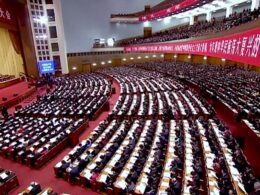By Daniel Waldron
“THIS PROTEST is for everyone. I have children, so this is for the future”, said a sacked car worker marching on 29 January, as France was rocked by a huge general strike in protest at the Sarkozy government’s attempt to make workers pay for the economic crisis, while giving bailouts to big business. An estimated 2.5 million took part in demonstrations across the country, with 300,000 out in Paris alone, making it the largest strike in the country for almost 20 years.
This is the first general strike in the country since Sarkozy took power in 2007, portraying himself as a strong man of capitalism who would face down the French working class. Sarkozy’s popularity, however, is at an all time low as anger at his attacks on workers and young people in the current economic climate bubbles over.
Public and private sector workers from eight major unions joined together in action, demanding that Sarkozy invest in protecting jobs and ending poverty wages, rather than stuff their taxes into the pockets of the super-rich who have been making record profits for years. A “stimulus package” of ?26 billion was announced in December to shore up the profits of the fat cats, particularly the French car industry bosses. Meanwhile, sweeping cuts in public services have been made, as well as many closures in the private sector, with massive job losses.
These attacks have been most brutal in education, with 17,000 job losses on the cards, on top of 11,000 last year, which will devastate teaching in state schools. Teachers, car workers, civil servants and transport workers formed the backbone of the strike, but it drew support from much wider layers of society. School and university students threw up barricades on campuses across the country in support of the strike, reminiscent of the mass movement in 2007 which forced the de Villepin government to abandon its draconian youth employment law. Professionals stopped work and joined the demonstrations. The Paris Stock Exchange, the centre of French capitalism, was hit as operative workers walked out in protest at Sarkozy’s servitude to big business! A poll found that 69% of the population were behind the unions’ action.
The head of the CDFT union, rather than recognising the determination of workers to fight back against Sarkozy, merely called the strike a “cry of anger”. Most union leaders, in deed if not in word, accept the capitalist mantra that industry must ultimately be run for profit, not for people’s need.
Revolutionary Left (CWI in France) intervened in the demonstrations, calling for rank-and-file activists to build pressure for determined and united action against Sarkozy’s programme of cuts, for nationalisation of threatened workplaces and for real investment into public services. Our sister organisation also argued that the struggle must have a political expression, and encouraged workers and young people to engage in the New Anti-Capitalist Party, which can potentially become an important vehicle to generalise and organise opposition to Sarkozy’s government and the capitalist system itself, which is at the core of the crisis confronting working people.
This general strike is only the beginning of what will undoubtedly be a rocky period for Sarkozy’s government and the French bosses.









